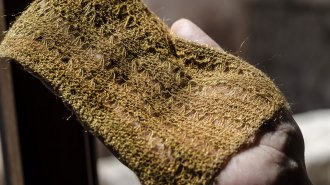Tiny Trouble: Nanoscale materials damage fish brains
- More than 2 years ago
In the field of nanotechnology, small might be better, but it’s not necessarily safe. Biologists have found that a type of nanomaterial called buckyballs can damage brain cells in fish. Buckyballs are one of the many nanomaterials that scientists are auditioning for roles in products ranging from cheaper solar cells to better medicines.
Nanoscale materials are already used as pigments in cosmetics and sunscreens, and many more nanomaterials could reach consumers in the next decade or so. The exceptionally small size of these materials, whose dimensions may be only a few ten-thousandths of the width of a human hair, endows them with unique chemical and physical properties. However, their small size could also permit them to interact with living cells in unanticipated, potentially hazardous ways.
“There are so many positive things that can come of nanotechnology, so we need to be looking at the toxicity of these things,” says biologist Eva Oberdörster at Southern Methodist University in Dallas. Since buckyballs are currently being manufactured in large quantities, she and her colleagues looked for potential environmental effects of these soccer ball-shape carbon molecules.
To determine the molecules’ toxicity, Oberdörster first tested the buckyballs on water fleas. The researchers added buckyballs to water tanks containing the small crustaceans. Over 48 hours, the team observed rising mortality with increased concentrations. They then calculated that at 800 parts per billion, 50 percent of the water fleas would die.
That makes the buckyballs “moderately toxic,” says Oberdörster, slightly more toxic than nickel yet less toxic than chemicals such as benzopyrene, which is found in cigarette smoke and car exhaust.
The researchers then exposed largemouth bass in a lab aquarium to buckyballs at concentrations of 500 to 1,000 ppb. After 48 hours, the researchers removed the fish and analyzed their tissues. Although none of the fish had died in the aquarium or displayed a change in behavior, the exposed fish showed 17 times as much damage to brain-cell membranes as did fish not exposed to buckyballs.
When the researchers looked at the activity of genes inside the fishes’ liver cells, they found that buckyball-exposed bass had switched on some immune-response genes that the unexposed fish hadn’t turned on, says Oberdörster, who presented her group’s findings this week at the American Chemical Society (ACS) meeting in Anaheim, Calif. That increased gene activity suggests the animals were fighting off the foreign material, she says.
Few studies have examined the toxicity and environmental effects of nanoscale materials. Some previous animal studies on nanoparticles other than buckyballs had shown that the materials can migrate from the nose to the brain (SN: 1/24/04, p. 54: Available to subscribers at Conduit to the Brain: Particles enter the nervous system via the nose) and from the lungs to other parts of the body. But the Dallas study appears to be the first to show that a particular nanomaterial can result in brain damage, Oberdörster says.
At the ACS meeting, Vicki Colvin of Rice University’s Center for Biological and Environmental Nanotechnology in Houston reported that buckyballs cause membrane damage in human cells growing in a lab. However, her research also showed that coating the buckyballs with simple molecules can prevent that toxicity.
“That’s a pretty easy thing to do,” Colvin says.
The buckyballs used in Oberdörster’s experiment were uncoated.
David Warheit, a toxicologist at DuPont in Newark, Del., says that not all nanomaterials show the same properties. Their behavior could depend not just on size but also on shape—whether they’re spheres or long tubes, for instance. “So, you can’t make generalizations about the toxicity of all nanomaterials,” he says. Figuring out exactly how they all differ, he adds, is going to be a big challenge.







